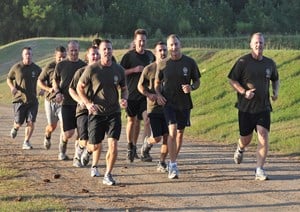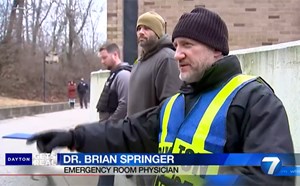
Letter from the Chair
Hello to all ACEP TEM Section members,
We are about halfway through the year 2021 and it has been a beautiful springtime in many areas of our wonderful country. I hope this letter finds you and yours well.
The world of tactical medicine continues to make advances, and I hope that as we approach summer, you are each able to contribute in your own way to support our brave Women and Men in Blue. Law enforcement has been challenged by the events of these past few years, and we all have struggled to make sense out of what is happening. The support that you provide is greatly appreciated, and I thank you for your commitment and dedication. It is an honor to take care for patients in the Emergency Department and prehospital setting, and an honor and privilege to work alongside those dedicated to the public safety 'triad': EMS, Fire/Rescue, and Law Enforcement.
The negative effects of the past year, unbalanced media coverage, and general lack of support for law enforcement has been difficult to watch. In any profession, there are areas for improvement, and there will be 'bad apples' whose behavior can result in tragedy. In police work, circumstances often dictate that a decision be made within seconds. The vast majority of our firefighters, police/ deputies, EMT / paramedics / prehospital medical professionals all perform their work heroically and outcomes are simply EXCELLENT. Too often we fail to show our appreciation.
In some cities, 30 or 40% of peace officers want to leave the profession. The Minneapolis Police Department has lost over 200 officers since May 2020, and the city leaders there have called out to local, state, and federal agencies for help in policing their community. In 2020 homicides rose 50% in Chicago, 46% in New York City, and the USA saw the largest annual percentage increase in homicides in recorded history, which has continued into 2021. No industrialized country has seen anything similar, as crime dropped in the U.K., Canada, and other nations this past year. As officers back off from proactive policing, we can expect things to get worse. The problem is criminals, not police. As physicians, we should be supportive of efforts to try to decrease problems associated with the lack of national standards and offer to work with law enforcement throughout our country and utilize our talents collectively to bring about positive change.
What can physicians do to support law enforcement officers?
1) Simply say "Thank You". Whether in the Emergency Department, a local park, or walking into a stadium with thousands of people, when you see a LEO in uniform, take a moment to stop, smile, and let them know how much you appreciate what they do.
2) Talk with your local police or sheriff's department, tell them what your specialty is, and offer to help. Do they need any medical support or direction? Would they appreciate a volunteer doctor to help teach tactical medicine, first aid, CPR / AED, or other topics such as healthy lifestyle, preventing heart disease, etc.? Volunteer to come to their next agency meeting and help educate the staff about a new medical topic or recent medical crisis / pandemic (hopefully we will not have another one of those in the next 100 years!)
3) Educate yourself about law enforcement and what it's like to be a peace officer. Seek training in topics and skills that will assist you when you volunteer your time in the law enforcement community. Then use that knowledge to help make a difference.
4) Keep up to date on events and issues in modern police work by subscribing to a law enforcement website. Police1 is free and covers training issues, real-world events, body-camera videos, and much more. If you are a physician or other tactical medical provider, but not a sworn LEO, go to police1.com and follow directions to sign up for their email list. Active members of a police department, sheriff's department, or other law enforcement agency can sign up as a verified member and receive additional LE sensitive materials.
5) Get involved in tactical medicine and support a tactical unit. Obtain training and experience in tactical emergency medicine and learn to provide direct close-up tactical medical care for your regional tactical teams / SWAT units. Find out what is done locally, perhaps you can join an existing TEMS unit.
6) Help fund the peace officers in your community. Help arrange a fund-raiser event for your local 'Superheroes' in the world of law enforcement, as well as Fire / Rescue, EMS, and other public health agencies.
Thank you for your dedication to excellence, and for supporting law enforcement. We will stay in touch and communicate more about the educational sessions we are planning in the near future. In the next few weeks we will send out a survey to all Section members to get your input and assistance on a few projects and future teaching topics.
Mark your calendars! Our Section annual meeting will be held at ACEP in Boston, on October 26 (Tuesday) from 1pm to 3pm Eastern time. We will try to stream on Facebook that day.
We hope you enjoy this newsletter. Special thanks to Dr. Dominique Wong, our Newsletter Editor, for her hard work in assembling information about the serious and sometimes controversial topic of managing agitated and potentially violent patients. Dr. Brian Springer has an excellent summary about management of agitated patients, and Dr. Keegan Bradley has important contributions as well. Dr. Wong has worked alongside a dedicated medical student to write up a summary of line of duty deaths (LODD) this past year, with important implications for now and the future. There are several other topics discussed in the newsletter, along with educational photographs that are available on our website Members-Only section.
Stay safe, and thanks to each of you for your dedication and support.
Dr. John Wipfler, MD, FACEP
Chair, Tactical Emergency Medicine Section




